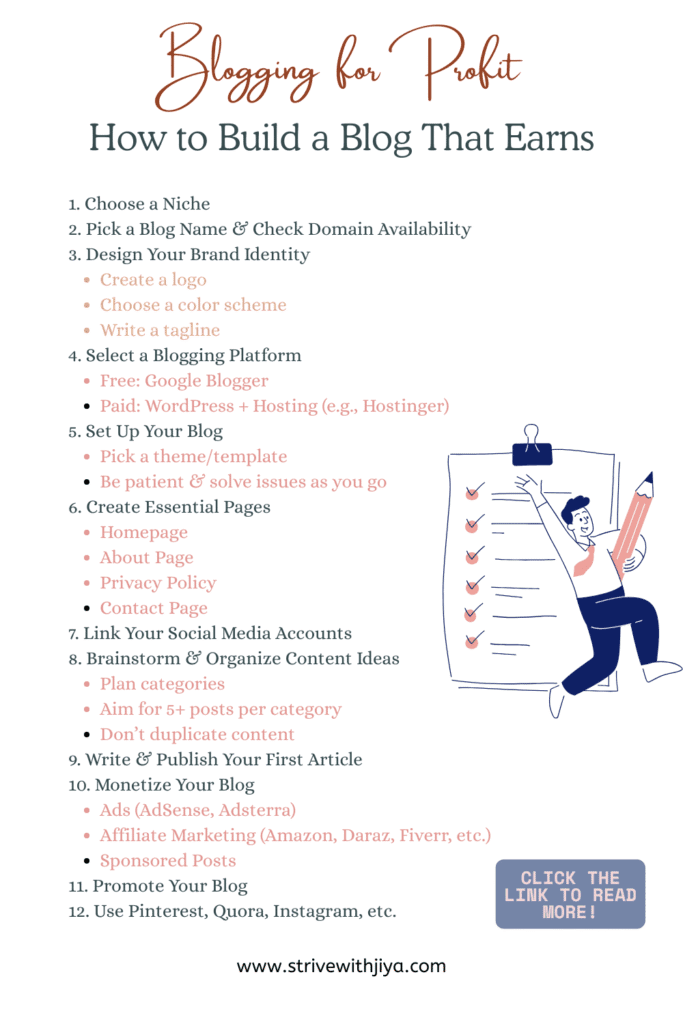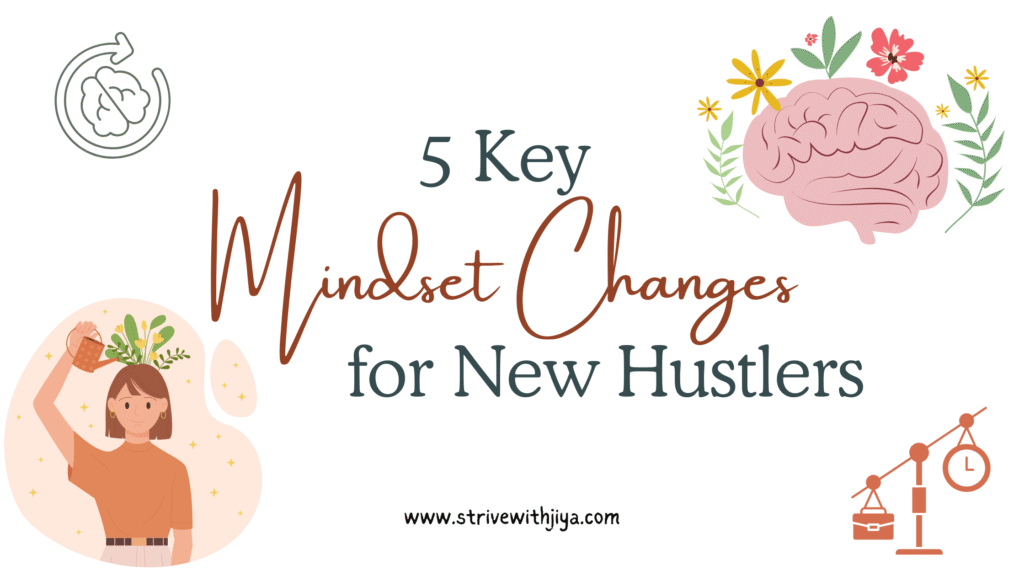
Blogging can be more than just a hobby, it can become a real source of income if done right. Whether you’re hoping to earn a little extra on the side or build a full-time business, this step-by-step guide will walk you through how to create a blog that has the potential to generate profit.
1. Choose a Profitable Niche
Your niche is the foundation of your blog. It’s important to choose a topic you’re genuinely interested in, but also one that has potential for growth and monetization. Think about what problems you can solve or what value you can offer to a specific audience.
2. Pick a Blog Name and Check Domain Availability
Once you’ve settled on a niche, it’s time to name your blog. Aim for a name that is memorable, relevant to your topic, and easy to spell. Don’t forget to check if the domain is available, especially if you plan to buy one. Tools like Namecheap or GoDaddy can help with this.
3. Design Your Brand Identity
A strong blog identity helps you stand out and builds trust with readers. Here’s what you’ll need:
- Logo: You can easily create one using tools like Canva or an AI logo generator.
- Color Scheme: Choose 2–3 complementary colors to use consistently across your blog and social media.
- Tagline: Write a short, catchy phrase that tells people what your blog is about.
4. Choose a Blogging Platform
You have two main options: Free or Paid.
- Free: Platforms like Google Blogger let you start without investment. I personally started with Blogger, and while it takes some effort and customization, it can look just like a professional site. You can check out my blogger website here as an example.
- Paid: Platforms like WordPress.org (self-hosted) offer more control and features. For this website I use WordPress and host my website on Hostinger, but there are other hosting providers you can explore.
5. Set Up Your Website
Once you’ve chosen your platform, it’s time to build your blog. Follow these tips:
- Be patient: Expect a learning curve. When I started, I ran into many issues, but solving them helped me grow. Keep researching, experimenting, and pushing forward.
- Pick a theme/template: Choose one that suits your content style and goals. Take your time to find something clean and user-friendly.
- Create essential pages:
- Homepage: This is the first impression of your blog.
- About: Share your story and what your blog is about.
- Privacy Policy: You can use templates or generators available online.
- Contact Page: Use plugins (on WordPress) or embed a form code (on Blogger).
- Navigation: Make sure your site is easy to navigate and double check to ensure all links lead to their respective destination.
6. Link Your Social Media Accounts
To build credibility and grow your audience, link your social media profiles to your blog. You can use existing accounts or create new ones using your blog’s name and branding.
7. Plan and Organize Your Content
Start by brainstorming blog post ideas. You can use AI tools, Google Trends, Pinterest, or keyword tools for inspiration. Then:
- Create content categories (e.g., Blogging Tips, Reviews, How-Tos).
- Stick to one category at a time: It’s better to have at least 5 articles in one category than just one post in several.
- Avoid duplicating posts across categories.
8. Write Your First Blog Post
Begin drafting your first article. I’ve shared my detailed writing process here. Keep your content useful, clear, and focused on helping your audience.
9. Monetize Your Blog
Once your blog is up and running, here are three ways to start earning:
a) Display Ads
- Start with platforms like Google AdSense once you meet their requirements.
- Other alternatives include Adsterra, especially if your content volume isn’t enough for AdSense.
b) Affiliate Marketing
- Promote products or services using affiliate links. You can join programs from Amazon, Daraz, Fiverr, Digistore24, and many more.
- This is one of the best ways to earn from a new blog with low traffic.
c) Sponsored Content
- Once your blog gains authority and audience, you may attract brands willing to pay for promotions or reviews.
10. Promote Your Blog
Content alone isn’t enough, you need traffic. Share your posts on social media, Pinterest, Quora, and other platforms. I’ve shared my favorite promotion strategies in this article (click here).
Blogging for profit is a journey that requires patience, learning, and consistent effort. Don’t worry if things don’t look perfect at first. Everyone starts somewhere, and the key is not to give up.
Keep learning, keep creating, and success will follow.

Also Read:
- 5 Key Mindset Changes for New Hustlers
- 22 Beginner-Friendly Ways to Start Earning Money Online
- How to Write and Publish Your First Blog Post
Recommendations:
- Full WordPress Course by 90s Mentor. (I made my website watching this playlist).
- WP-Beginner-WordPress Tutorials YouTube Channel. (My go-to YouTube Channel whenever I face issues or when I want to learn something new).
- Some Website Niche Ideas
- Comparison of Different Free Website Building Platforms
- “Create a Pro Website” YouTube Channel. You can find a lot of useful tutorials here if you build your website using Elementor. Unfortunately, I use block editor as I didn’t know about Elementor when I was creating my website.




thanks for info.
You’re welcome 🙂